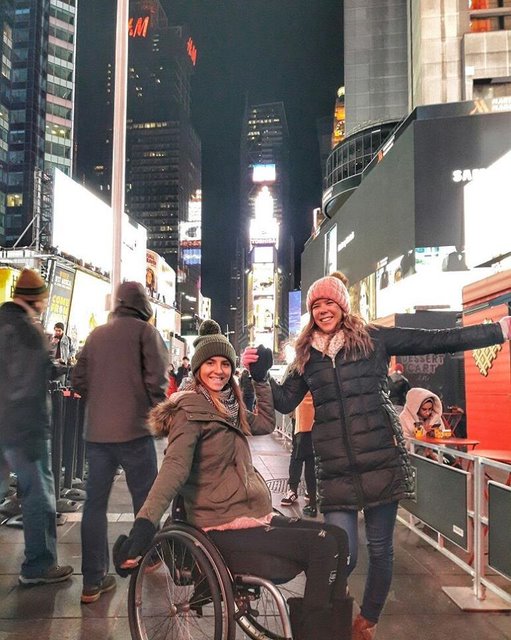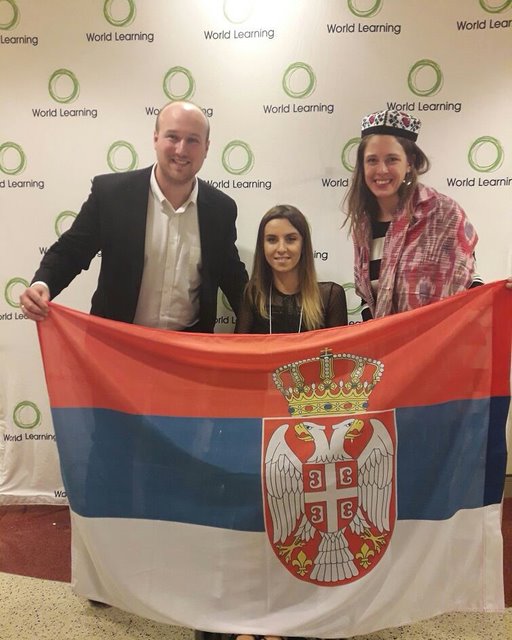Alumni Update: Milica Knezevic, Serbia
As we approach the 30th anniversary of the Americans with Disabilities Act on July 26, 2020, Milica Knezevic, a Global UGRAD alumna (2017-18), is using discussions about COVID-19 quarantines and curfews to raise awareness of about the lives of people with disabilities in Serbia. A wheelchair user since the age of 15, Milica has become a prominent disability rights activist and advocate in Serbia.
Today, many countries worldwide still have not implemented much to allow their citizens with disabilities access to resources offered to everybody else. Two years ago, sharing her experience from the Global UGRAD exchange, Milica wrote: “In the U.S. everything is accessible, and just the way it should be. After eight years, I was able to travel on my own and live independently, which changed my life because finally everything was up to me.”

Milica’s struggle for the rights of people with disabilities continues even in the days of the COVID-19 pandemic. On her Facebook page, she explains how the COVID-19 curfews are temporary, but the quarantine for those with disabilities spans their entire lives:
“During these 11 years since I have been using the wheelchair, this is the first time that I have not left my apartment, not going to the supermarket or hanging out with my friends; I don’t have meetings with faculty, don’t train outdoors, and have to adjust my habits to protect the health of all of us. Even before this pandemic, all of these, and many other things were denied to me, even things that weren’t my choice. Those who don’t know me well will say that this is not true, because I have a job, I study, travel, volunteer with my fiancé, and train for sports. However, the truth is, I am able to do all of this thanks to the wonderful people around me who help me live in the way I have chosen, and without whom, my entire life would be a quarantine. Unfortunately, many people with disabilities do not have such support, or any support at all. For those people, their life is a month, a year, or a lifetime of quarantine.
I recently read that I am responsible for my “quarantine” (not the pandemic) and my life spent in a wheelchair, which is very untrue, and easy for anyone to say, especially a person who doesn’t know what it is like to be a wheelchair user. My quarantine is not the consequence of the disability, but solely because of denying people’s right to move freely (which has been discussed a lot these days), as well as the prejudices surrounding the disabled.

This situation will end, and you will come back to your everyday activities, as you should, but the right to unrestricted movement will still be denied to many of us. I hope that you will then remember all of these people who don’t have access to education, who cannot leave their apartments, who don’t have access to public transportation and health institutions, and who experience discrimination daily. My hope is that this serves as a means of motivation for you to support the freedom of movement (for persons with disabilities) even if you have not been denied this freedom yourself.”
Milica’s story has been shared with Facebook followers of the U.S. Embassy in Serbia and the news outlet telegraf.rs, which also decided to interview Milica after seeing her post. You can find more information and the interview here: https://www.telegraf.rs/vesti/srbija/3176989-milica-je-11-godina-u-kolicima-kad-se-korona-zavrsi-setite-se-onih-koji-su-ceo-zivot-u-karantinu
Milica’s Facebook group can be found here: https://www.facebook.com/izaberidazivis
Written by Milica Knezevic (Serbia) who studied at Wright State University during the 2017-18 program year.